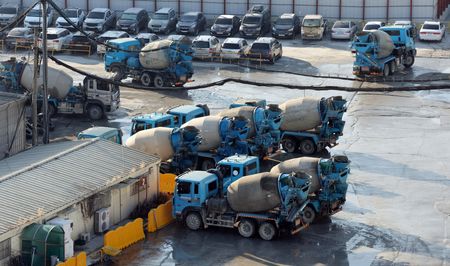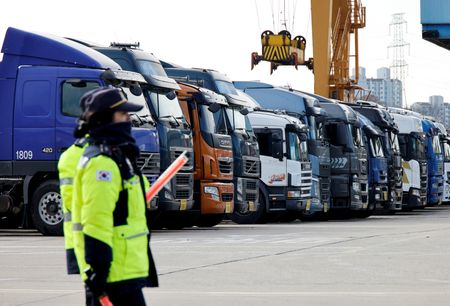By Heekyong Yang and Ju-min Park
SEOUL (Reuters) -South Korea ordered truckers in the steel and petrochemical industries to end their strike on Thursday, widening a back-to-work decree beyond the cement industry after nationwide industrial unrest has disrupted supply chains.
As the government increases pressure, the truckers’ union said it would vote whether to end its action.
Members will cast a vote on Friday, a union official said.
Tens of thousands striking truckers are demanding a minimum wage programme be made permanent. The government has refused, saying it would only extend the current program for three more years.
The Democratic Party, an opposition party that holds a majority in parliament, has supported the government’s stance, party lawmakers told reporters.
“The government remains steadfast. We absolutely have to break the vicious cycle of an unjustified organised act,” Prime Minister Han Duck-soo told a cabinet meeting on Thursday.
The second strike in less than six months has hampered supplies of goods from cars to fuel, costing the country 3.5 trillion won ($2.66 billion) in its first 12 days, the government said this week.
President Yoon Suk-yeol has said his administration would not give in to what it says are the truckers’ union’s “unjustified demands”.
Negotiations between the union and the government have not led to any breakthrough, but some striking drivers say the loss of income during the strike means it is difficult for drivers to maintain the industrial action.
About a third of 2,000 fuel tankers are on strike, and by late on Wednesday, 78 petrol stations had run out of fuel nationwide, many of which were in the Seoul metropolitan region, government data shows.
Last week, the government issued a “start work” order to force 2,500 striking drivers in the cement industry back on the road. About 35% of 2,600 fuel tanker drivers across the country are striking, media reports have said, citing the industry ministry.
Steel shipments are running at 48% of normal levels, and shipments of petrochemical products have fallen to about 20%, the transport ministry said on Thursday, raising concerns that those disruptions would affect production of cars and ships.
Petrochemical companies are considering cutting production as early as this weekend because of shortages of raw materials and of space for unused inventory.
The “start work” order last month was the first time the government had forced striking workers to resume work. Failure to comply can lead to cancellation of licences, three years in jail or a fine of up to 30 million won ($22,550).
The government has said its order has been effective in getting striking truckers back on the road, but the union says it will take legal action with the help of certified labour attorneys to defy the order.
(Reporting by Heekyong Yang, Ju-min Park, additional reporting by Soo-hyang Choi; Editing by Christian Schmollinger, Gerry Doyle and Barbara Lewis)


